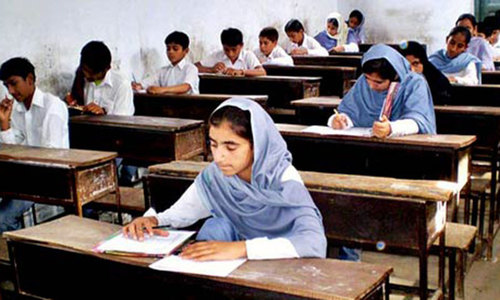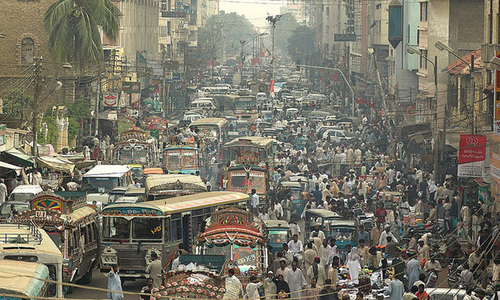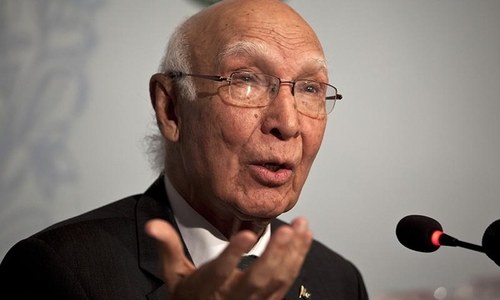POPULATION explosion, though missing from the country’s policy discourse, presents one of the most serious threats to our national security.
There may not be a simple causal relationship between demography and security, but evidence shows that high population growth is a major destabilising factor in the least developed countries. There are many examples to show that tensions leading up to conflict may have been heightened by demographic pressures.
Explore: Exploding population bomb
One of the highest population growth rates and a huge youth bulge have created an extremely dangerous situation for Pakistan. We could have used our demographic power to turn around the country’s economy, but with little investment in education and slow economic growth, the youth bulge is fast becoming a liability and serious threat to the country’s internal security.
The inability of the state to productively utilise a large young generation has already turned the country into a breeding ground for violent extremism, and could cause further social dislocation and conflict.
The Pakistani youth bulge: a ticking time bomb
This runaway population growth has created vast ranks of restless young men with few prospects and little to lose. Their frustrated ambitions can be an explosive force. More troubling is that there is no realisation about this lurking threat. A study conducted by Population Action International shows that about 80 per cent of the world’s civil conflicts since the 1970s have occurred in countries with young, fast-growing populations.
Pakistan is a stark example of that; thousands of people have been killed in militant and extremist violence, earning the country the dubious distinction of being one of the world’s most violent places.
Indeed, there are multiple domestic and international reasons that are responsible for the rising violent extremism in Pakistan. But it is not just religious fanaticism that drives young men to resort to violence. It also has much to do with the failure of the state to turn this young population into productive citizens.
Pakistan is sitting on a potential demographic disaster.
Pakistan is sitting on a potential demographic disaster with more than 120 million of its population under 25 years of age. This high number of young people is the face of today’s Pakistan. This new generation is also at the centre of an unresolved ideological struggle about what sort of country Pakistan should be. With an extremely low literacy rate and bleak job opportunities, the future prospects of the young generation are uncertain and dark.
*Take a look: To be young in Pakistan *
Growing frustration among the youth makes them vulnerable to prejudices and extremism. The gravity of the situation can be assessed by the fact that 32pc of our young generation is illiterate and the majority of the others are school dropouts. Enrolment rates are the lowest in South Asia. Pakistan’s spending on education is around 2pc of the GDP, about half that spent by India. The poor quality of education hardly equips the youth to face the challenges of the globalised world they live in, further pushing them towards isolation.
Furthermore, the widening social, cultural and economic divide has made the less advantaged youth receptive to extremism and violence. It has created a mindset that facilitates a militant agenda. Many studies have shown that there is a direct link between religious extremism and social and economic marginalisation.
The instability resulting from severe demographic pressures has led to civil war in many countries. Pakistan will not be too far away from such a situation if its present drift continues. In fact, we are already in the midst of one. The growing alienation of young generations and their feelings towards the government and state have been illustrated in some recent surveys. The youth’s despair is deep-seated in the present conditions.
With little or no education, as well as the lack of economic opportunities, they have not much to look forward to. Few are hopeful of getting jobs. The continuing downslide of the economy indicates that things are not getting better. Pakistan’s population has doubled over the past few decades.
The 2017 population census has shown that Pakistan has moved up the ladder, becoming the fifth most populous nation only behind India, China, the US and Indonesia. With a staggering growth rate of 2.4pc per annum, the country’s population is around 207m. That marks an increase of more than 57pc since the last population census in 1998, and is higher than what had been projected.
Pakistan needs an annual economic growth rate of at least 6pc to 7pc to absorb millions of people entering the job market every year. The population of the unemployed has drastically risen with the economic growth rate averaging around 3pc over the past decade, thus creating a dangerous situation
All this has left the country struggling to provide for a rapidly expanding populace. It is a disaster in the making. What is most worrisome is that this population explosion and its implications have drawn little attention from the political leadership.
Despite the gravity of the situation, the issue has hardly figured in the national discourse. The PTI government that says it is committed to human development appears to have completely ignored the challenge that presents the biggest threat to political stability and national security. Human development is not possible without dealing with the problem of high population growth.
It is a nightmare scenario fast unfolding. Firm and decisive action is needed to contain the population explosion before it is too late. The consequences of further delay will be disastrous. Economic and social problems faced by the country cannot be dealt with effectively unless population growth is brought under control. Other countries have done it, and it should not be difficult for us either. But what is needed is political will and a clear policy.
It may be late but the situation can still be salvaged with the government taking the issue more seriously. The exploding population bomb has put the country’s future in jeopardy. Is the government listening?
The writer is an author and journalist.
Twitter: @hidhussain
Published in Dawn, October 24th, 2018
Download the new Dawn mobile app here:















































